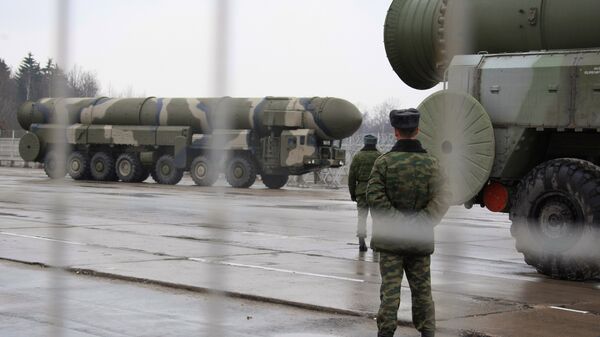The nature of modern warfare demands that Russia's air and space defense be under unified command. This is the conclusion reached by leading military experts at a roundtable organized by the Rosbalt news agency on December 15. The experts discussed the section on military matters in President Dmitry Medvedev's recent state of the nation address to the Federal Assembly. The experts' discussion centered on creating an air and space defense command in Russia and the possibility of a new arms race between Russia and the United States.
The need for a space command
For years now there has been talk of creating joint air and space defense forces in Russia, but the president's statement should catapult the subject from the realm of theory into practice.
The new command should include anti-aircraft and missile defense units (AA and ABM), an early warning system for missile attacks (EWS) and a space surveillance system (SSS). This strategic air and space command will become the foundation of Russia's strategic defense system.
Initially, the command will provide cover only for Moscow, the Central Industrial District and the high command of the Armed Forces.
The planned deployment of next-generation anti-aircraft missile systems (which should be able to intercept ballistic missiles) will deepen the unification of air and space defense, and enable Russia to establish areas that are super protected from attack from the air or space, including launch sites of the Strategic Missile Forces (SMF).
"Air and space defense is a key element of our national defense," said Igor Korotchenko, editor in chief of the magazine Natsionalnaya Oborona (National Defense). "The nature of modern warfare is changing, and the role of several types of aircraft is growing. A new generation of strike systems is also under development. These new systems will be able to strike targets from space."
But Mr. Korotchenko also pointed out that the exact form and capabilities of the new command are not yet clear.
"A number of bodies have already started to hog the spotlight," he added. "We can assume that the new command will be formed on the basis of the former Special Purpose Command for the anti-aircraft defense of Moscow, and it is clear that the prime contractor to supply new equipment and weapons systems will be Almaz-Antey, which should just be renamed the Air and Space Defense Company already."
European missile defense: Cooperation or arms race?
In his address to the Federal Assembly, President Medvedev said that failure to reach an agreement on missile defense in Europe could trigger a new arms race.
"I'd like to speak plainly about the choice we face in the next ten years: either we reach an agreement on missile defense and establish meaningful cooperation, or a new round of the arms race will begin," the president said.
According to President Medvedev, if an agreement on missile defense is not reached, Russia will be forced to deploy new offensive weapons.
Experts have reacted to the president's statement and the possibility of Russian-NATO cooperation on a European missile defense system by noting that the final shape and purpose of the European missile defense system is still up in the air.
"The European missile defense shield is, in fact, an element of the national missile defense system of the United States," said Grigory Tishchenko, head of defense policy at the Russian Institute of Strategic Studies.
"And in the future, the U.S. missile defense system could be a threat to Russia's strategic nuclear forces," he added.
Vasily Belozyorov, co-chairman of the Association of Military Political Scientists, said that Russia joining the European missile defense system would radically alter the global political landscape.
"We have traditionally supported Iran and denied that it poses a military threat. Russian participation in the missile defense system would imply that we do see Iran as a threat," Belozyorov said.
Whatever the prospects for missile defense, experts have also said that a renewed arms race is unlikely.
"The United States and Europe will try to draw Russia into the orbit of their strategic interests, for example, through the process of working together on Iran or Afghanistan," said Tishchenko. "Europe will involve Russia in their military and political structures up to a point. Europe and the United States need what Russia can offer, so they have no interest in starting an arms race."
There is essentially no chance of a repeat of a classic, Cold War-era arms race - missile for missile, tank for tank and so on. This would be unsustainable for any country's economy. In the event of a serious cooling in relations between Russia and the United States (NATO), there would perhaps be a "race of approaches," where each party seeks an asymmetric response to steps taken by the "potential enemy." This kind of race is less costly, but it will divert resources away from solutions to the real problems in the world - terrorism, local conflicts, piracy, drug trafficking and arms trafficking. If left unchecked, who knows the damage these problems could unleash?
The views expressed in this article are the author's and do not necessarily represent those of RIA Novosti.

